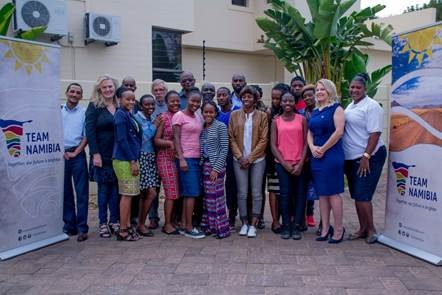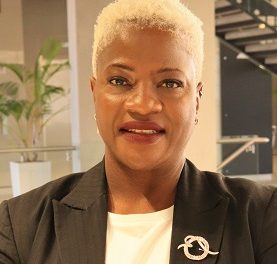
Team Namibia runs with vigour, starts new training programme for Katutura SMEs

Twenty five SME owners from Windhoek’s Katutura suburbs completed their first module in business training during the first week of September as part of a five-module programme offered by Team Namibia, supported by the Embassy of Finland.
Team Namibia’s new account director, Bärber Kirchner said their focus is on supporting the development of entrepreneurship and to enhance the capacity of small to medium enterprises, to ensure their growth and sustainability. “Moreover, we strive to inspire competitive standards and stimulating consumer confidence for the increased consumption of local goods and services,” she said.
The demand for business training from SMEs is so overwhelming, Team Namibia received around 400 applications after the programme was announced. The most promising 100 candidates were interviewed and from these 25 were selected for the full programme.
The programme covers basic business principles, regulatory requirements of a business, procurement procedures, production management, personnel management, marketing, and financial management. The training sessions are facilitated by Professor Rainer Trede from Decosa.
According to Kirchner impacting economic sustainability will ultimately support national efforts of creating employment, generating income and permanently reducing poverty.
Members of the Finnish Embassy attended the first day of training as observers noting afterwards their appreciation for Team Namibia’s energy to develop entrepreneurial skills among small business owners.
“Supporting projects of this nature creates new opportunities for people, encourages entrepreneurship and provides business owners with the necessary skills. In the current state of the national economy, views are shifting to additional ways to make a living. The growing urban settlements offer a chance for businesses and marketing, but it is a question of finding the correct product and a niche” stated the embassy.
Trainees’ comments
“The training is beneficial and comes with many guidelines on how to run a business,” commented Domingo Sandu, one of the course participants. “I have learned about joint ventures, which we hardly see in Namibia. Because of my new knowledge, I am already in discussions with another business owner to form a joint venture. He has a well-established company in the food industry, and he might introduce one of my products in his enterprise,” Domingo explained.
“The first training module was an eye-opener,” said chicken farmer, Albert Handunge. “I thought I knew a lot but realised there are many things about running a business that I am not aware of.”
Andreas Shaanika said “Sometimes entrepreneurs want to do everything when it comes to business. I have learned that there are certain phases you have to complete before getting to the entry point of business.”
More training sessions
The programme consists of five training modules spaced over six to eight weeks. Coaching and mentoring sessions supplement the training modules. The next training sessions will take place on 16 to 20 October 2017 (module 2); 12 to 16 February 2018 (module 3); 9 to 13 April 2018 (module 4); and 4 to 8 June 2018 (module 5).
The Embassy of Finland is funding the project through their Fund for Local Cooperation labeled the Mobilisation of Production and Trade Capacities of Small Enterprises in Katutura.











































